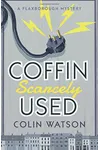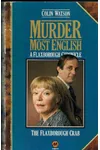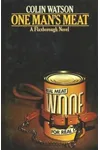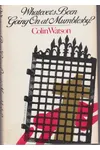Step into the charmingly deceptive world of Flaxborough, where quaint English streets hide secrets as twisty as a country lane! Colin Watson’s Flaxborough Chronicles is a delightful series of mystery novels that blend sharp wit, cozy crime, and sly social commentary. Centered on the unflappable Inspector Walter Purbright, these tales unravel the darker underbelly of a fictional Lincolnshire town, proving that even the sleepiest villages buzz with intrigue.
With its golden-age mystery vibes and a cast of eccentric characters, Flaxborough invites readers to solve crimes alongside Purbright, whose polite persistence cuts through small-town hypocrisy like a hot knife through butter. Whether you’re a fan of classic whodunits or crave a humorous take on human foibles, this series is a hidden gem waiting to be discovered.
How Flaxborough Began
Born in Croydon in 1920, Colin Watson drew inspiration for Flaxborough from his time as a journalist in Lincolnshire, where he worked for the Boston Guardian. The fictional town is a composite of Boston and nearby villages like Horncastle and Sleaford, capturing their quaint charm and quirky inhabitants. Watson’s debut novel, Coffin, Scarcely Used, hit shelves in 1958, launching a 12-book series that ran until his death in 1983. His knack for blending humor with crime earned him two CWA Silver Dagger Awards and a lasting, if underappreciated, legacy.
The Heart of Flaxborough
The Flaxborough Chronicles follow Inspector Purbright as he navigates murder, greed, and deception in a town that’s equal parts idyllic and insidious. Key titles include Coffin, Scarcely Used, where a councilor’s death sparks a chain of suspicious events tied to odd newspaper ads, and Lonelyheart 4122, which sees Purbright unravel a sinister lonely hearts agency after two women vanish. Bump in the Night takes him to nearby Chalmsbury to probe explosions that escalate into murder, while The Flaxborough Crab tackles a peculiar case of an elderly troublemaker wreaking havoc.
Watson’s themes dig into the hypocrisy and pretension lurking beneath polite society, with Flaxborough’s respectable facade masking greed and corruption. His dry wit and vivid characters—like the ladylike conwoman Lucilla Teatime—bring a satirical edge, while the Lincolnshire setting grounds the stories in a timeless, pastoral charm. The series’ cozy yet incisive style makes it a standout in British mystery fiction, blending Golden Age puzzle-solving with modern social critique.
Why Flaxborough Resonates
Though less celebrated today, the Flaxborough Chronicles left a mark on the mystery genre with their blend of humor and humanity. Four novels were adapted into the BBC’s Murder Most English in 1977, bringing Purbright’s world to life with Anton Rodgers in the lead. Critics like H.R.F. Keating praised Watson’s creation for its vivid, almost literary depiction of small-town life, comparing Flaxborough to the richly imagined worlds of Arnold Bennett. Fans cherish the series for its clever plots and Purbright’s quiet decency, a beacon of civility in a genre often dominated by gritty detectives.
Watson’s ability to poke fun at human nature while crafting airtight mysteries ensures Flaxborough’s enduring appeal. Its niche status only adds to its allure, offering a refreshing escape for readers seeking something beyond mainstream crime fiction.
- Publication Years: 1958–1983
- Number of Books: 12
- Awards: CWA Silver Dagger (1962, 1967)
- TV Adaptation: Murder Most English (1977)
Grab Coffin, Scarcely Used and dive into Flaxborough’s witty, wicked world of mystery! Whether you’re chuckling at Lucilla Teatime’s schemes or unraveling Purbright’s latest case, this series promises a cozy yet cunning adventure you won’t soon forget.










